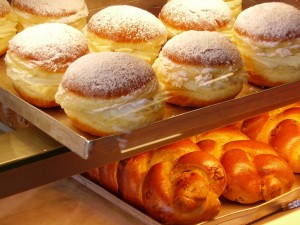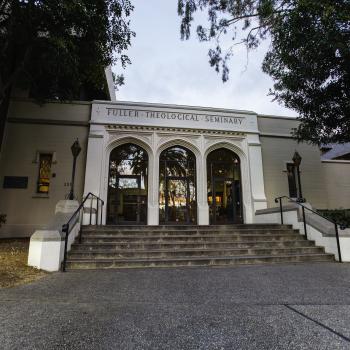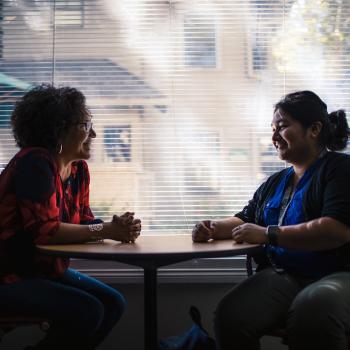By Rachel Paprocki
I have one of those familiar-looking faces that often fools people into thinking that they know me. This happens, I think, because I’m an ethnically ambiguous young woman living in the greater Los Angeles area. Am I your cousin’s Armenian roommate? Your half-Filipina high school lab partner? I can’t blame you for thinking so. Whether or not I actually do turn out to be the person someone thought I was from across the street, I seem to attract a lot of small talk. It’s a sometimes-inconvenient situation for a person who prefers anonymity, but it’s come in great handy in the past few years. It might actually have been a lifesaver, or at least a life preserver.
I didn’t know anyone when I moved to Pasadena in the fall of 2011 to begin a masters program at Fuller. That situation only lasted for about 36 hours, because I happened to walk with resume in hand into one of LA’s most popular European-style bakeries when they were hiring. Nearly daily for two years I walked or rode my bicycle the few miles to the bakery to don an apron and dish out the most perfect croissants this side of the Atlantic to Pasadena’s diverse population: soccer moms of all colors, rocket scientists, rocket scientists who are also soccer moms, famous food critics, movie stars, recent immigrants, the mayor, the homeless people of Colorado Boulevard.

When there is food involved, it doesn’t take long for people on both sides of the pastry case to share personal details. Owing to the nature of this job in hospitality and to the familiar look of my brownish little face, there are a whole lot of people wandering around this city who know who I am, my course of study, where I practice yoga, what book I’m reading—and this is still true now, a year after I stopped working at the bakery. I recognize faces who recognize me back, both of us wondering whether we know this person from middle school or the morning muffin routine at the bakery. This is not because I’m an awesome or very interesting person but because we have spent lots of time together (too much, I have sometimes felt) literally breaking bread.
For some of us, when bad things happen (and they always do), it is a natural inclination to hunker down internally and wait for the storm to pass. I was poised under such a cloud for most of my time at Fuller, and until quite recently most days I just wanted to sit down alone and not talk to anyone about anything. But I didn’t have that luxury or any remotely similar to it, thanks to my mostly less-than-glamorous job. When my grandmother passed away in 2013, and then my grandfather a few months later; when I bought my dream bicycle; when I was diagnosed with severe clinical depression; when I graduated from Fuller; in all of these moments I was surrounded by a colorful passel of people who should have been strangers, whether I wanted them there or not. They felt like they knew me, so they wanted to talk to me and for me to talk to them; since we shared a dining room, this was only fitting. It was a pain in my side, but it probably kept me alive.
Here is the point of this: how much more wonderful could congregational life be if clergy and churchgoers treated their shared existence together in the Sunday sanctuary less like a time for training in apologetics and more like this: That precious stolen moment in the beginning of the day, before anything has had a chance to go wrong, when the coffee is fresh; the solitary, bright noon lunch of crisp vegetables; the slow evening pause for a breath and a sweet treat before the midnight oil is lit and the ovens turn on to bake tomorrow’s bread.
It takes a village of people and quite a bit of time to make communion happen. It’s a sacred thing and a privilege. The ritual of taking and eating reminds us where life comes from, even though we don’t always like the taste or the company. Community often grows out of the relationships that we do not choose, in the places we would rather not be. It might be beneficial to admit that church meetings are sometimes exactly that, even when (and for some, especially when) those meetings are meant to foster relationships.
The point of making church more like a café should not be to draw people in with saccharine promises about spiritual caffeine highs and a bohemian aesthetic, because that commodifies community and cheapens hospitality, which is at once a craft and a spiritual practice. But there are people slipping through the cracks in church communities who require the investment of attention if they are not to be left behind. We are all those people, and if we say that there is room for all of us at the table, then there should be a physical table, it should have real, really delicious food on it, and we should all be able to notice if someone is missing, whether or not they have a recognizable face.
Rachel Paprocki survived being raised in Murrieta, CA by knitting and reading voraciously. An alumna of Pepperdine University (BA, 2010) and Fuller Theological Seminary (MA, 2014), she has earned her keep with a year-long stint teaching English in northeastern China and then by making coffee in the greater Los Angeles area, which she traverses by bicycle. She is the managing editor of the the Fuller Writing Center.












